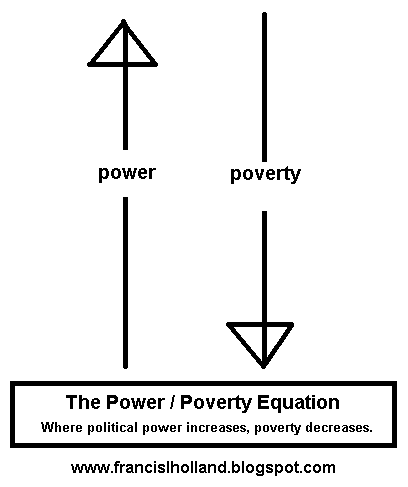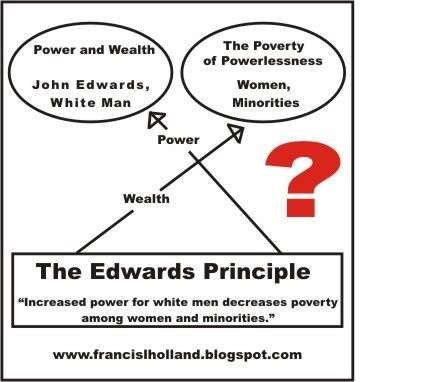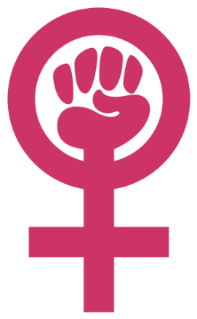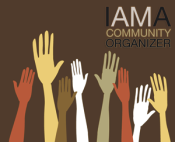I also made the argument (modified) at Huffington Post (Edwards Tells Supporters, 'Vote for Me Because I'm a White Man.'), and at my own blogs and elsewhere, and it helped to serve notice on Edwards and progressives that Blacks and women were not going to support the election of a 44th white male president in 2008. I was reviled and exiled from many a blog, but I was right and I was vindicated, and that's what ultimately counts to me personally, but not nearly as much as ending the 43-term white male monopoly of the presidency.
It's worth noting that the graphics below infuriated supporters of John Edwards specifically and of the white male supremacy paradigm in general. I also know these arguments were influential because Hillary Clinton's Internet Activism Manager Peter Daou called me by telephone in Brazil to personally enlist my support for Hillary, (for all the good it ultimately did him and his candidate.) Daou asked me not to discuss our conversation before Hillary formally announced her candidacy, and I kept my promise not to do so. Actually, Hillary is Secretary of State now, so none of our efforts on her behalf were wasted, even if virtually all Blacks eventually rejected Billary's color-aroused politicking and were driven to support Senator Barack Obama instead. "Billary and Me: Time to Break the Silence"
WHY would electing John Edwards Lift Women and Blacks from Poverty?
Cross-posted at http://francislholland.blogspot.com/
This is an historical and political analysis of the central premise that underlies John Edwards' claim to the Presidency. This essay asks and explores the question, "Why Will Electing John Edwards Raise Women and Minorities Out of Poverty?" Everything in the above graphic represents only my own original paraphrased appreciation of the thrust of arguments made by others.
Everyone who has superficially studied the problem of American poverty knows that, although all demographic groups are represented among the poor, women and minorities are more likely to be poor than other segments of our society (e.g. white men).
In fact, historical patterns of discrimination that legally prevented women and minorities from buying and owning property, opening bank accounts, and moving to areas where opportunities were greater - all of these governmentally sponsored factors and more led to the feminization and the "racialization" of poverty. The poverty of Blacks began when we were forced to work for free, with government returning us to our "owners" if we escaped slavery with the intention of being paid for our own labor.
In light of this history of the causes of poverty, it is quite impossible to talk about alleviating poverty without discussing how to systematically root out the carefully lain government sponsored roots of poverty in de jure and de facto gender and color-based discrimination. To the degree that there is anything at all that the government is still doing that intentionally or effectively disadvantages the target populations of a proposed new poverty program, to be effective in alleviating poverty government must stop doing anything and everything that has historically led and continues to lead to the feminization and colorization of poverty.
Let's face it: Poverty programs are expensive. Just gathering the statistics to know whether the programs are succeeding or not typically costs millions of dollars, while any intervention to lift people from poverty costs more still. The Republican criticism of the poverty programs of the 1960's is that liberals were unwilling to examine the assumptions underlying these programs and were similarly unwilling to carefully measure whether the programs actually worked or not.
But there is one assumption that neither Republicans nor Democrats have been willing to examine: the unexamined assumption that women and minorities can be lifted out of poverty without increasing the representation of women and minorities in government. The corollary unexamined assumption is "women and minorities can be lifted out of poverty by increasing the power of white men." Effectively, every time we vote for a white man over a woman or minority, we vote to increase the overall power of that demographic group while maintaining the political powerlessnes of the other demographic groups.
The assumption that government sponsored poverty programs and benefits can improve the condition of women and minorities without increased access for women and minorities to the levers of power is an untested and unproven assumption that has provided precious little enduring results in the past. But the economic status of women and minorities HAS consistently improved when their voting rights and access to elective office have increased. It makes intuitive sense that the political will to continue supporting poverty programs will be stronger if members of the demographic group benefiting from the programs are in elective office, where they can vote to continue funding for programs that are helpful to them.
Arguably the most enduring government-sponsored act of the 20th Century toward alleviating poverty was the guarantee to women and minorities of the right to vote and hold elective office - a right that we had never had before the 20th Century. And, arguably, a substantial portion of the enduring alleviation of poverty that has occurred has come directly from the new right of women and minorities vote for candidates who represent our interests and to hold office and thereby help fashion an economy and legal framework in which women and minorities, too, are likely to prosper.
Here is but one example of how increased political power within a demographic group leads to increased economic well-being: If you want to open a small business, you generally need a business license and various other government approvals. Ostensibly, licenses are granted according to Byzantine rules that anyone can master with sufficient lawyers and money. However, in most places, personally knowing the members of the various licensing boards (or the officials who appointed the licensing officials) is very helpful in obtaining crucial information and businesses licenses that allow a person to open a business, work and improve the financial condition of self and family. To the extent that a demographic group lacks this informal access, it will also lack access to the government when it needs government licences and permitting.
Considering how many people are not poor because they have started businesses that result in steady income, it seems obvious that electing more women and minorities to government for the purpose of helping each other to obtain information access, and business licenses is an obvious anti-poverty intervention.
Until the Civil War, white men used their control of state and national government to prevent slaves from successfully escaping and competing with white men for the proceeds of Black men's labor. White men forbade women to work outside the home, effectively forcing women to work for white men. If only white men ran the government today, would they not use their control of business licenses to preclude women and minorities from opening competing businesses, just as they once used their political power to prevent Blacks and women from opening bank accounts?
Isn't it true that whomever holds the reigns of government tends to make more money?

America has tried various solutions to end poverty, but increasing women and minorities' participation in government has never explicitly been one of the government-sponsored solutions. Is this solution so absurd that it ought not be tried, at least once, particularly considering that many other solutions that have been mostly unavailing are nonetheless tried over and over again?
Enter John Edwards: Let's ignore, for a moment, the fact that electing John Edwards would perpetuate the historical pattern of disadvantaging women and minorities by never electing a president who is not a white male. Let's focus specifically and exclusively for a moment on the extraordinary claim that underlies John Edwards' claim to the presidency.
John Edwards says that America's most urgent problem is poverty, and he proposes that we elect him President and give him 30 years to alleviate this problem. But, most importantly for this discussion: While running for President against three liberal Democrats who are members of the target demograpic groups most affected by poverty (women, Blacks and Latinos), John Edwards has made the extraordinary and counter-intuitive assertion that electing him, a white man, is the best way to reduce the poverty of women, Blacks, and Latinos.
Of course, Edwards' is a self-serving premise, i.e., "The best way to help THEM is to give something to ME!" But showing that the premise is self-serving does not, by itself, prove that the premise is incorrect. It merely make the premise suspect.
It is not impossible that electing John Edwards can help to alleviate poverty. The question is, "Is electing John Edwards the BEST way to alleviate the poverty of women and minorities who have historically lacked the political power to organize society in a way that would support their economic enfranchisement?
When a politician claims that giving food to people in Washington DC will reduce hunger in Washington DC, then we are apt to agree. But when a politician claims that giving food to people in Boston is the best way to decrease hunger in Milwaulkee, that is an EXTRAORDINARY claim that requires extraordinary analysis of the assumptions underlying the proposed program.
Many people will demand to know how giving a liberal Democratic woman or minority the power to help shape the economy and the economic framework within which business operate would help lift women and minorities out of poverty. To me, this is like the question, "How will the distribution of food in Boston help to alleviate the problem of hunger in Boston?" It's like asking, "How will giving a fisherman a boat help him to fish?" People who have access to the resources the need are more likely to use those resources to improve their circumstances. If this is NOT so, then nothing Government does will help women and minorities. So, the question is whether to hand out more benefits or to empower women and minorities to benefit from sharing the reigns of power.
If one of the reasons for governing is to manage the economy in a manner that helps to improve the financial circumstances of citizens, doesn't it stand to reason that if responsible liberal Democratic women and minorities are elected, they will use the power entrusted to them to help women and minorities succeed economically?
Why would we choose to believe the opposite: that white men, (who are competing with women and minorities for resources and advantages) will use the power of elective office to help people who are NOT of their demographic group? Everything in America's history and its present circumstances - with white men in power - suggests that the opposite is true. The longer white men are the majority of the US Senate, the US House and have a lock on the Presidency, while controlling the apparatus of the power of the 50 states, the longer women and minorities will lack the political power to lift themselves out of poverty.
I think that, for the purposes of our discussion today, it is essential that we limit ourselves to testing John Edwards' premise, that electing him is the best way to lift women and Blacks out of poverty, better than electing a liberal Democratic woman or Black person. That question is sufficiently complex that it is worth spending at least one day considering it, by itself, before going into the voting booth.
How, specifically, is electing John Edwards going to reduce the poverty of women and minorities. I think this is a fair question to ask?
As a threshold issue, it seems necessary to remind readers that any discussion of whom our 2008 presidential nominee will be should necessarily be limited to a discussion of the Democrats. Whenever I assert that electing a woman or minority president will help American in one way or anther, someone urgentlydemands to know whether electing a REPUBLICAN woman or minority would help America. That is a specious, in my mind, question since the premise of all of our activities is that electing Democrats is better. Moreover, since there are Democratic women and minorities running for president, it is hardly necessary to speculate about the effect of electing a Republican candidate.
Responding to the proposal to elect a woman by asking whether a Republican woman would suffice is like responding to the same proposal by asking whether a child-molesting cannibalistic ex-convict schizophrenic woman would suffice. How is that relevant to the question of whether, as between two elected and respected liberal Democratic officials, the election of a woman or minority will help America to progress? Certainly, raising the specter of electing a woman or Black Republican is an unhelpful and superficial debating technique with no relevance whatever to the discussion at hand.
And yet this technique is often used by "progressives" to derail urgent discussions of whether increased numbers of women and minorities in government will significantly change the nature of American society. The technique only serves, if tolerated, to perpetuate the status quo, the control of America's government by white men.
And so I pose the urgent question: In light of the high correlation between historical patterns of political disenfranchisement and poverty for America's women and minorities, with white men in power, how do we know that electing electing John Edwards as president is the best way to lift politically disenfranchised women and minorities out of poverty?
To me, the premise is counter-intuitive, lacks empirical support, is not based on an historical or sociological appreciation of the direct causal relationship between the feminization and colorization of political powerlessness and the feminization and colorization of poverty.
Author's note: I have designed the graphics here to represent my own interpretation of the political and economic facts involved, and so I have paraphrased, in my own way, what I believe to be the thrust of the arguments involved. I suspect that many people will disagree with these representations, but the purpose of these graphics is to challenge assumptions and encourage us to clarify our thinking about our underlying premises.




No comments:
Post a Comment